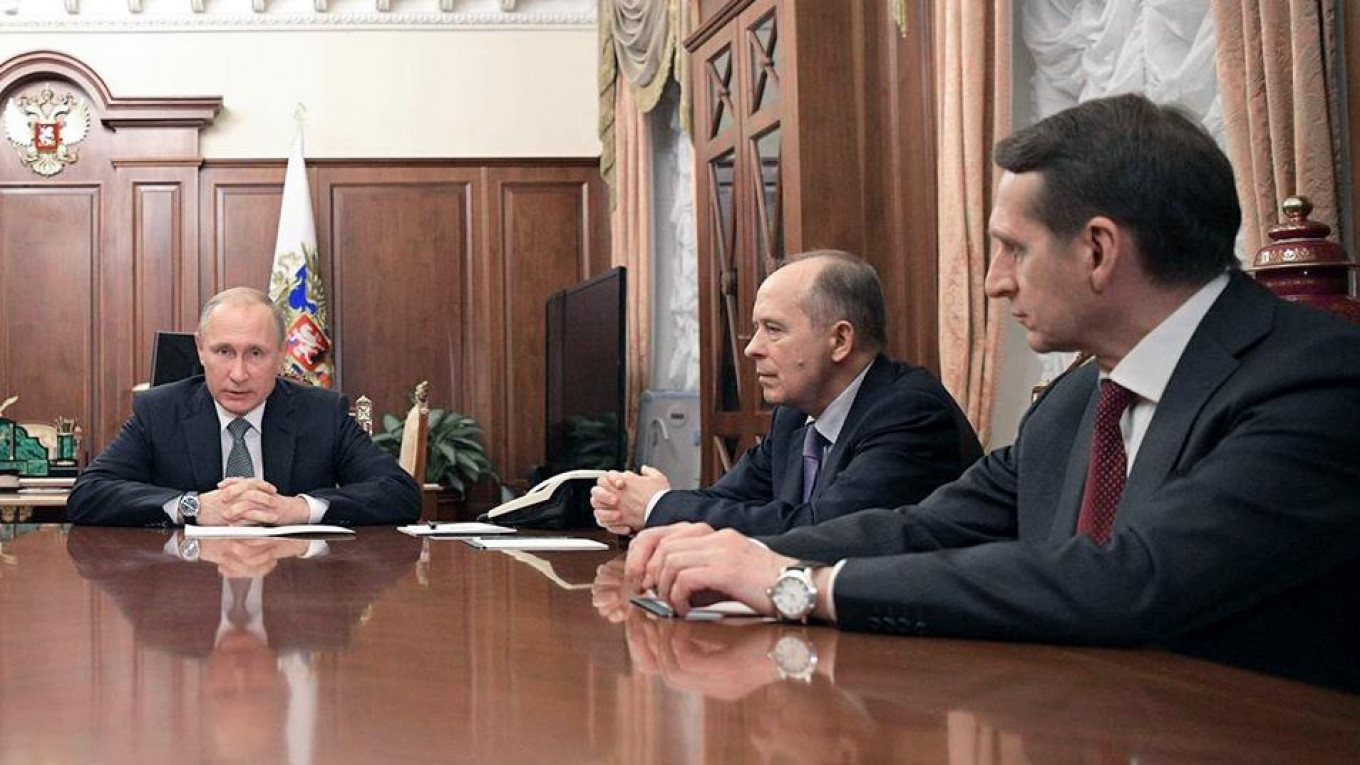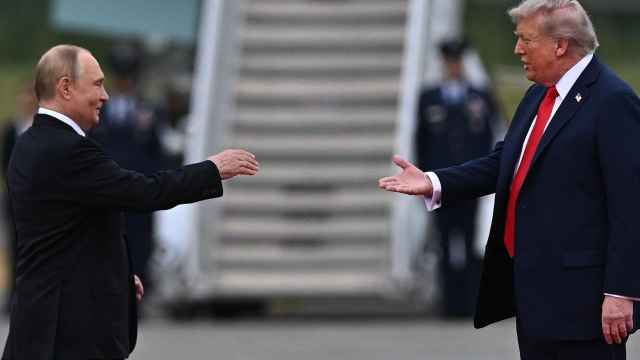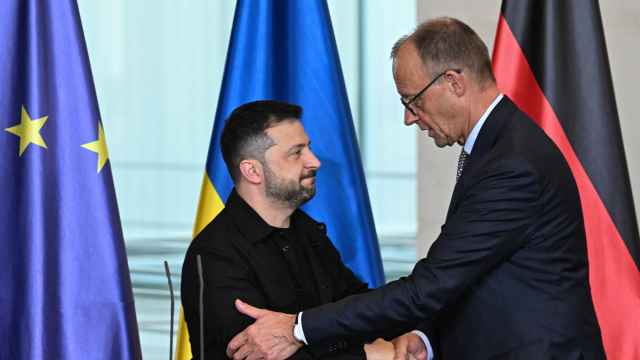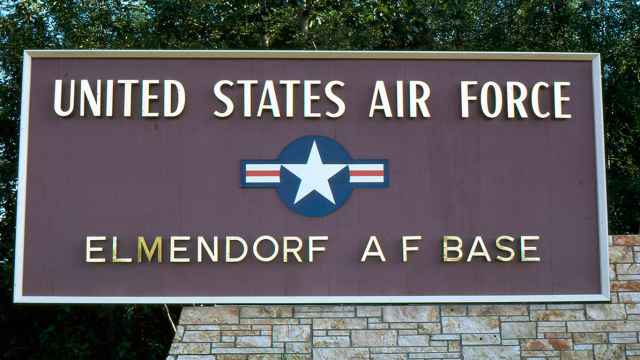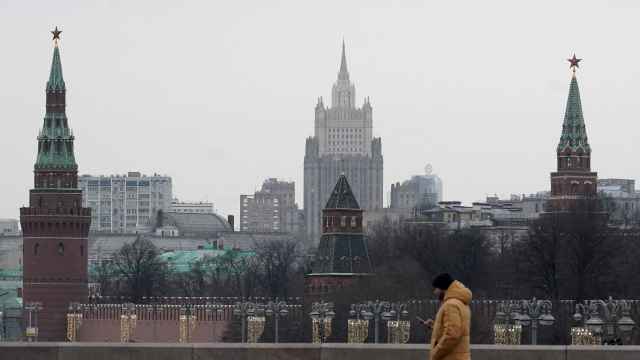Russia’s Foreign Intelligence (SVR) Director Sergei Naryshkin and Main Intelligence Directorate (GRU) head Igor Korobov — both of whom are personally targeted by U.S. sanctions — along with the Federal Security Service (FSB) chief all travelled at the same time in January to the United States.
It was an extraordinary event given the adversarial state of U.S.-Russian relations.
The political implications of this visit likely extend far beyond the counter-terrorism operations and will probably remain a mystery for some time.
The visit by Russia’s three highest-ranking siloviki might be the result of the Trump administration’s decision to hold off — for now — on increasing the pressure on Russia through new sanctions, as mandated by the Countering America’s Adversaries Through Sanctions Act (CAATSA).
The White House issued a watered-down version of its “Kremlin list,” refused to impose new sanctions against Russia’s defense and intelligence sectors and published a report on the negative effects of U.S. sanctions on Russia’s national debt.
It apparently saw this as the best way of meeting current U.S. security interests. From this perspective, the assertion by Swedish economist Anders Aslund that a top White House official scrapped the original “Kremlin list” at the last moment and replaced it with a larger list copied straight from a Forbes magazine ranking of rich Russians does not look so far-fetched.
The list was published just minutes before the deadline imposed by law. However, if it had been such a non-offensive listing of names right from the start, there would have been no reason to delay its publication.
This suggests there was a struggle inside the White House, and it suggests the last minute drawing up of a new version of the document. Perhaps that means the Trump administration had good reason not to aggravate relations with Russia, and the talks with visiting Russian siloviki might have provided such grounds.
The unprecedented visit by the heads of all three intelligence services indicates that President Vladimir Putin and U.S. President Donald Trump made this political decision themselves — and probably right after the CIA helped the FSB prevent a major terrorist attack in St. Petersburg — for which Putin thanked Trump personally.
However, just coordinating efforts in the fight against terrorism — including in preparation for the World Cup in Russia, as the Russian side reported — does not justify this kind of high-level visit.
Effective channels already exist for the exchange of intelligence information through CIA and FBI representatives in Moscow and SVR and FSB representatives in Washington. Even the exchange of information by U.S. and Russian intelligence agencies providing security for the Winter Olympics in Sochi took place at lower levels.
In fact, neither the GRU nor its U.S. counterpart, the Defense Intelligence Agency (DIA), had previously figured in counter-terrorism activities in general. And the FBI, which plays the main role in fighting terrorism on U.S. territory, was not mentioned in recent reports by Russian siloviki.
Media in Russia and the U.S. reported on Naryshkin and Bortnikov’s meetings with CIA Director Mike Pompeo and National Intelligence Director Dan Coats — which were logical. The reports did not indicate with whom GRU Director Korobov met, although it is understood that he did not meet with Pompeo.
Neither did the Pentagon divulge information about a meeting involving DIA Director Lieutenant General Robert Ashley. According to reports in Russia, the siloviki met with White House Chief of Staff John Kelly and U.S. Secretary of Defense Jim Mattis. Sources in the U.S. have not confirmed this — this would violate protocol.
Even in friendlier times, when the U.S. and Russia did not describe each other as enemies, the heads of their special services visited one at a time. While serving as DIA director in 2013, Michael Flynn flew to Moscow to visit GRU headquarters — a.k.a. “the aquarium.”
High-level contacts continued even after events in Crimea and Donbass: the administration of former U.S. President Barack Obama invited FSB Director Alexander Bortnikov — the only one of the three not targeted by sanctions — to attend an international anti-terrorism forum in Washington in February 2015.
What’s more, CIA Director Mike Pompeo visited Moscow in May 2017 at the height of the hysteria over “Russian interference” in the U.S. elections. That meeting took place only days after President Trump allegedly revealed highly classified U.S.-Israeli intelligence during a meeting in the Oval Office with Foreign Minister Sergei Lavrov and the former Russian ambassador to Washington.
It is also surprising that the unabating scandal over Russian interference in the U.S. elections — interference that the U.S. intelligence community claims is continuing to this day — had no effect whatsoever on the unprecedented visit by the siloviki.
Just prior to the visit, Dutch media reported that intelligence agencies there had proof that the Cozy Bear hacker group controlled by the SVR broke into the Democratic National Committee’s computers.
The unabating scandal over Russian interference in the U.S. electiond had no effect whatsoever on the unprecedented visit by the siloviki
In fact, former President Obama imposed special sanctions against the SVR and FSB in December 2016 for interfering in U.S. elections, including personal sanctions against GRU Director Korobov and his deputies.
The U.S. never accused the SVR of involvement, and the personal sanctions against Naryshkin were imposed for events in Crimea in 2014, when he served as State Duma Speaker. United States law allows for a temporary suspension of sanctions restrictions, including the ban on entry to the U.S., in the interests of national security.
However, only senior White House and State Department officials, acting at the request of intelligence agencies, have the authority to lift sanctions — and in the current politically explosive situation in connection with alleged Russian interference, probably only President Trump could have made this kind of decision.
Moscow had long sought to thaw relations between the two countries’ intelligence services to coordinate the fight against international terrorism. This was especially true after the election of Trump who, like his former Security Adviser Michael Flynn, gave positive signals during the campaign that the new administration would work to restore normal relations with Russia.
The famous memorandum that Deputy Foreign Minister Sergei Ryabkov presented in February 2017 not only suggested renewing those channels of cooperation but also included a timetable for meetings between the heads of the intelligence services. And now, in a major coup for Moscow, those meetings have taken place.
Confidential contact between the two countries is the optimal format at present for gradually restoring relations.
The secrecy of those meetings and their narrow focus on specific issues such as the fight against terrorism make it possible to avoid unwanted publicity, inflated expectations and the kind of political intrigue that could undermine progress.
Senate Minority Leader Charles Schumer demanded that U.S. intelligence chiefs provide detailed information about the meetings with Naryshkin and Bortnikov, including a description of the range of issues discussed.
He asked to know, for example, if they raised the questions of sanctions, the readiness of the administration to report on CAATSA and Russian interference in U.S. elections. CIA Director Pompeo said that all of the most sensitive issues were discussed.
The talks in Washington with the Russian siloviki probably focused on cooperation in combating terrorism — and specifically efforts towards what is apparently a major initiative by U.S. intelligence to prevent foreign ISIL militants from returning from Syria and Iraq.
It is difficult to imagine, however, that the U.S. leadership overlooked this opportunity to pass along political messages concerning other important bilateral and international agenda items concerning, for example, Ukraine, Iran, or North Korea.
Of course, this format is not ideal for confidential negotiations because none of the intelligence directors is an all-around expert and each would have had to bring along two or three of the relevant analytical and operational unit chiefs.
The official representatives of Russia’s intelligence services stationed in Washington would also have joined the delegation, swelling the total to as many as 15 people or more.
On the other hand, that would have enabled participants to crosscheck all information and thwart unwanted conspiracy and inter-departmental intrigue.
True, it places the Russian Foreign Ministry in a somewhat awkward position: as a rule, the ambassador does not participate in talks with intelligence agencies. However, the Foreign Ministry is now mainly responsible for perceptions of Russia abroad, protocol and propaganda functions.
It is also noteworthy that the Russian side was the source of the leak about the visit.
First, Putin mentioned during a meeting with confidants that FSB head Bortnikov would be traveling to the U.S. Then, in a landmark “60 Minutes” episode, Russia’s U.S. Ambassador Anatoly Antonov — clearly speaking on instructions from the Kremlin — mentioned that SVR Director Naryshkin had recently visited the U.S.
Of course, observers in the U.S. regarded this as an attempt by Moscow to exploit disagreements between U.S. intelligence agencies and the White House leadership, and as a manipulative maneuver in support of Trump’s desire to establish cooperation with Russia.
The visit also generates tangible political points for Moscow leaders and serves as a demonstration of strength by the main candidate in Russia’s upcoming presidential elections. In any case, Moscow has won this round by avoiding not only new U.S. sanctions on the eve of elections but also the need to take costly countermeasures.
The door to normalizing relations is now slightly ajar.
Vladimir Frolov is a Russian political analyst regular contributor to Republic.ru, where this article was first published. The views and opinions expressed in opinion pieces do not necessarily reflect the position of The Moscow Times.
A Message from The Moscow Times:
Dear readers,
We are facing unprecedented challenges. Russia's Prosecutor General's Office has designated The Moscow Times as an "undesirable" organization, criminalizing our work and putting our staff at risk of prosecution. This follows our earlier unjust labeling as a "foreign agent."
These actions are direct attempts to silence independent journalism in Russia. The authorities claim our work "discredits the decisions of the Russian leadership." We see things differently: we strive to provide accurate, unbiased reporting on Russia.
We, the journalists of The Moscow Times, refuse to be silenced. But to continue our work, we need your help.
Your support, no matter how small, makes a world of difference. If you can, please support us monthly starting from just $2. It's quick to set up, and every contribution makes a significant impact.
By supporting The Moscow Times, you're defending open, independent journalism in the face of repression. Thank you for standing with us.
Remind me later.



